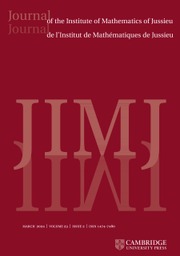Article contents
Difference fields and descent in algebraic dynamics. I
Published online by Cambridge University Press: 07 October 2008
Abstract
We draw a connection between the model-theoretic notions of modularity (or one-basedness), orthogonality and internality, as applied to difference fields, and questions of descent in in algebraic dynamics. In particular we prove in any dimension a strong dynamical version of Northcott's theorem for function fields, answering a question of Szpiro and Tucker and generalizing a theorem of Baker's for the projective line.
The paper comes in three parts. This first part contains an exposition some of the main results of the model theory of difference fields, and their immediate connection to questions of descent in algebraic dynamics. We present the model-theoretic notion of internality in a context that does not require a universal domain with quantifier-elimination. We also note a version of canonical heights that applies well beyond polarized algebraic dynamics. Part II sharpens the structure theory to arbitrary base fields and constructible maps where in part I we emphasize finite base change and correspondences. Part III will include precise structure theorems related to the Galois theory considered here, and will enable a sharpening of the descent results for non-modular dynamics.
MSC classification
- Type
- Research Article
- Information
- Journal of the Institute of Mathematics of Jussieu , Volume 7 , Issue 4 , October 2008 , pp. 653 - 686
- Copyright
- Copyright © Cambridge University Press 2008
- 16
- Cited by


